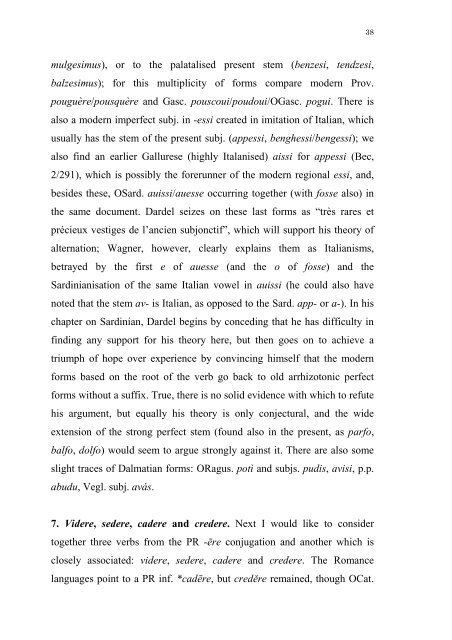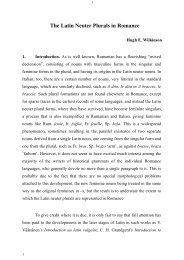THE STRONG PERFECTS IN THE ROMANCE ... - Page ON
THE STRONG PERFECTS IN THE ROMANCE ... - Page ON
THE STRONG PERFECTS IN THE ROMANCE ... - Page ON
You also want an ePaper? Increase the reach of your titles
YUMPU automatically turns print PDFs into web optimized ePapers that Google loves.
mulgesimus), or to the palatalised present stem (benzesi, tendzesi,<br />
balzesimus); for this multiplicity of forms compare modern Prov.<br />
pouguère/pousquère and Gasc. pouscoui/poudoui/OGasc. pogui. There is<br />
also a modern imperfect subj. in -essi created in imitation of Italian, which<br />
usually has the stem of the present subj. (appessi, benghessi/bengessi); we<br />
also find an earlier Gallurese (highly Italanised) aissi for appessi (Bec,<br />
2/291), which is possibly the forerunner of the modern regional essi, and,<br />
besides these, OSard. auissi/auesse occurring together (with fosse also) in<br />
the same document. Dardel seizes on these last forms as “très rares et<br />
précieux vestiges de l’ancien subjonctif”, which will support his theory of<br />
alternation; Wagner, however, clearly explains them as Italianisms,<br />
betrayed by the first e of auesse (and the o of fosse) and the<br />
Sardinianisation of the same Italian vowel in auissi (he could also have<br />
noted that the stem av- is Italian, as opposed to the Sard. app- or a-). In his<br />
chapter on Sardinian, Dardel begins by conceding that he has difficulty in<br />
finding any support for his theory here, but then goes on to achieve a<br />
triumph of hope over experience by convincing himself that the modern<br />
forms based on the root of the verb go back to old arrhizotonic perfect<br />
forms without a suffix. True, there is no solid evidence with which to refute<br />
his argument, but equally his theory is only conjectural, and the wide<br />
extension of the strong perfect stem (found also in the present, as parfo,<br />
balfo, dolfo) would seem to argue strongly against it. There are also some<br />
slight traces of Dalmatian forms: ORagus. potì and subjs. pudis, avisi, p.p.<br />
abudu, Vegl. subj. avás.<br />
7. Videre, sedere, cadere and credere. Next I would like to consider<br />
together three verbs from the PR -ēre conjugation and another which is<br />
closely associated: videre, sedere, cadere and credere. The Romance<br />
languages point to a PR inf. *cadēre, but credĕre remained, though OCat.<br />
38









